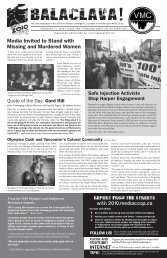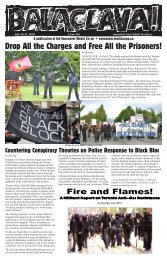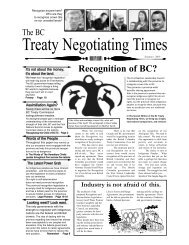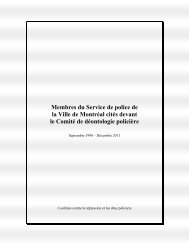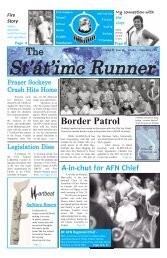storytelling
april fp.qxp - The Media Co-op
april fp.qxp - The Media Co-op
- No tags were found...
Create successful ePaper yourself
Turn your PDF publications into a flip-book with our unique Google optimized e-Paper software.
Ka-hál'ha I pétsklha 2010 The St’át’imc Runner<br />
Tmicw<br />
Page 7<br />
Sek'wel'wás crews restore forest that<br />
"Even the deer<br />
can't get through.”<br />
Community wildfire<br />
protection work has been<br />
going full swing throughout<br />
most of the winter. Federal<br />
relief monies for the mountain<br />
pine beetle epidemic<br />
have made funds available<br />
to get safe-making work<br />
done around the communities.<br />
In Sek'wél'was, a<br />
crew has been falling dead<br />
trees, pruning branches up<br />
to ten feet up the trees, and<br />
clearing brush and debris<br />
on the ground. All this<br />
should avert a crown fire in<br />
the forest, if a fire is lit by<br />
accident on the ground.<br />
Michelle Edwards<br />
organizes the restoration<br />
and clean-up work around<br />
the community. Her background<br />
in forestry includes<br />
BC-standard training and a<br />
lot of traditional knowledge<br />
of how the Elders in the<br />
community used to take<br />
care of the land. She is an<br />
advocate for traditional<br />
burning, pruning and clearing.<br />
These practices contribute<br />
to forest health - the<br />
health of the trees, being<br />
properly spaced; the health<br />
of the plants underneath,<br />
having room to grow; and<br />
the health of the soil.<br />
Looking over one of<br />
the areas next to the Seton<br />
hydro canal, the improvement<br />
after work is obvious.<br />
Next to an overcrowded<br />
new growth of fir trees, the<br />
spaced and pruned trees<br />
show off exactly what<br />
Michelle is after. "We never<br />
used to let the forest get to<br />
that state, where now it's<br />
too thick and there is debris<br />
and brush all over the<br />
ground. We were always on<br />
the land, using the wood<br />
and managing for the plants<br />
and berries."<br />
Strategic burning<br />
opens the land and enriches<br />
the soil. It is one of the best<br />
ways to cultivate berry<br />
patches. And the wood<br />
waste on the forest floor<br />
needs to constantly be<br />
cleared. "Imagine how<br />
much firewood two hundred<br />
homes here were using<br />
in a winter!" Michelle<br />
points to the rubble on the<br />
ground, which chokes out<br />
the plants and is a fire hazard.<br />
"Even the deer can't<br />
Above, some restored forest on the<br />
Sek'wel'wás Reserve.<br />
Left, Evan, Bill, Karen and Andrew.<br />
get through there."<br />
Many communities<br />
have taken advantage of a<br />
Natural Resource Canada<br />
Mountain Pine Beetle<br />
Program grant that allows<br />
for clean up in lands adjacent<br />
to Reserves. While<br />
many Reserves are surrounded<br />
by private land,<br />
where the clean up can't be<br />
done by this grant, the<br />
areas that can be accessed<br />
are being restored by community<br />
crews.<br />
Wild Salmon Café:<br />
Culture of the Salmon Crash<br />
"Síma wi<br />
sts'úqwaz'!" The declining<br />
sockeye has brought two<br />
cultures into one room to<br />
honour and celebrate the<br />
salmon that make life possible<br />
in the Fraser watershed.<br />
On March 20, the<br />
first ever Wild Salmon Café<br />
featured poets, spoken<br />
word - with hand drum;<br />
dancers, singers, speakers,<br />
and rock and roll.<br />
Salmon Talks<br />
Lillooet is a group that<br />
formed last Fall to bring<br />
that state of all salmon in<br />
the Fraser into focus. The<br />
group involves youth,<br />
Elders, Stát'imc and nonnatives,<br />
professional biologists<br />
and fisheries technicians,<br />
political leaders and<br />
community. Education and<br />
action is the objective.<br />
With a salmon, chili<br />
and beef dinner served up<br />
by the Unity Riders,<br />
fundraising for their<br />
upcoming journey, people<br />
listened and talked about<br />
what the state of the salmon<br />
is. And what can we do?<br />
Petitions, information<br />
brochures and documents<br />
from similar campaigns<br />
from the coast to the<br />
headwaters were presented.<br />
But the Café<br />
showed up another thing<br />
that needs to be done: we<br />
need to get together. If<br />
DFO will not heed science<br />
or its own commissioned<br />
recommendations, such as<br />
moving to closed containment<br />
fish farms, who will<br />
ensure that salmon are sustainable?<br />
The answer is, the<br />
people. The Wild Salmon<br />
Policy, 2005, is not being<br />
implemented. We know<br />
what needs to be donefor<br />
the salmon: protecting<br />
fresh water systems like<br />
Fish Lake; removing barriers<br />
or creating passages<br />
around them, like at hydro<br />
facilities; removing opennet-cage<br />
fish farms from<br />
the migration route of the<br />
salmon smolts; and limiting<br />
developments that impact<br />
habitat.<br />
If the evidence of<br />
endangerment of salmon<br />
won't make the government<br />
act, people will have to.<br />
The Stát'imc Sisters sang at the Cafe.<br />
Here Nora Billy sings "Síma wi<br />
sts'úqwaz'!" while a bear looks on.



